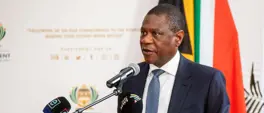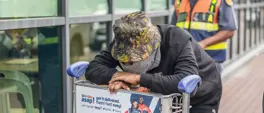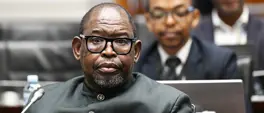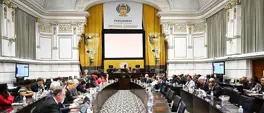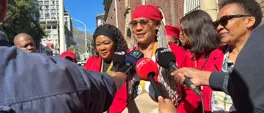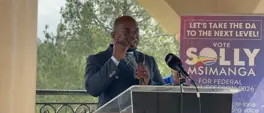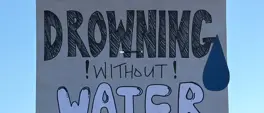CHARLES MATSEKE | Brown Mogotsi a bad choreography: South Africa's justice system is now part of the performance
Charles Matseke
17 November 2025 | 8:10South Africa’s scandals don’t break anymore; they premiere. They arrive with dramatic flair, cliffhanger energy, and just enough spectacle to keep the public watching, writes Charles Matseke.
- Madlanga Commission of Inquiry
- Brown Mogotsi
- Hangwani Maumela
- Julius Mkhwanazi
- KZN police commissioner Nhlanhla Mkhwanazi

Chevrolet that North West businessman Brown Mogotsi was travelling in this Chevrolet sedan and allegedly shot in Vosloorus, Ekurhuleni, on 3 November 2025. Picture: Alpha Ramushwana/EWN
One can tell a state is collapsing when even its scandals stop making sense. Whatever happened to Brown Mogotsi the night his red Chevrolet Aveo was riddled with bullets, whether hit, hoax, or something more carefully curated, the real story is the criminal justice system’s refusal to act.
Eleven bullets fired. No blood. Conflicting eyewitness accounts. “Thumb-sucked” dates in affidavits. A police service that moved with the urgency of a buffering wheel. This is not incompetence, it is choreography in disarray.
South Africa’s scandals don’t break anymore; they premiere. They arrive with dramatic flair, cliffhanger energy, and just enough spectacle to keep the public watching.
But consequences? Arrests? Prosecutions? Those never make it into the final cut. As I argued in earlier op-eds on elite impunity and the “Republic of Commissions,” our justice system has perfected the art of performance without resolution.
A national theatre where evidence is abundant but accountability is always missing in action. The Mogotsi saga is simply the latest proof.
A supposed assassination attempt involving eleven shots should trigger an immediate, airtight response.
Instead, the narrative grew stranger by the hour. How does a man emerge untouched from seats penetrated by multiple bullets? Why were his initial statements delayed? Why did eyewitness accounts contradict each other so wildly that journalists began referencing slapstick rather than forensic logic?
This story has all the hallmarks I previously highlighted in my analysis of the Tembisa Hospital scandal and the “Republic of Commissions”: high drama, zero resolution.
As with Julius Mkwanazi and the Tembisa case, where I wrote that illegal tenders, assassinations, and politically linked supply chains were met with police lethargy, Mogotsi’s situation reveals the same old crisis. South Africa has become a country of unfinished stories.
If Mogotsi’s case sounds familiar, it is because we have seen this choreography before.
The Special Investigating Unit (SIU) recentlyraided the home of Hangwani Maumela in Sandton.
They seized luxury vehicles, froze assets, and publicised the scale of the alleged corruption. The visuals were powerful; the optics persuasive. It was easy to believe that accountability was finally within reach.
But just as I warned in my op-eds on the Maumela matter and the hollowing out of enforcement institutions, the SIU is not an arresting body. It exposes corruption, yes, but it lacks the prosecutorial hammer. So despite the spectacle, no arrests were made. No court appearances followed.
The accused walked away untouched, reaffirming the central argument I’ve made repeatedly: revelation in South Africa is not the beginning of justice, but the end of it.
The Independent Directorate Against Corruption (IDAC) was created to be a modern Scorpions, fearless, fast and aggressive against high-level corruption. Instead, it has become a bureaucratic echo.
Investigations stall, prosecutions evaporate, and its leadership increasingly appears overwhelmed or politically constrained.
In previous pieces, I cautioned that IDAC risked becoming a “decorative institution”: visible, but toothless. Mogotsi’s case proves that prediction is cruelly accurate.
Then there is the National Prosecuting Authority (NPA). In my earlier commentary on selective justice, I argued that the NPA is bold only when dealing with the powerless.
When the accused are politically connected or embedded in syndicate networks, the NPA’s courage fades.
Mogotsi and Maumela are now textbook examples.
Both cases involve clear contradictions, serious allegations, and compelling evidence, yet both remain untouched by prosecutorial resolve.
The South African Police Service deserves special mention because Mogotsi’s case exposes just how deeply SAPS has retreated from its constitutional mandate.
A high-risk incident involving a witness linked to commission testimony should have triggered immediate action: securing the crime scene, interviewing witnesses promptly, protecting the alleged target, and communicating transparently.
Instead, SAPS offered contradictory updates, allowed Mogotsi to delay his statement, floated the idea that the attack might have been staged, and then simply waited.
As I wrote in my piece on police involvement in cable theft and blue-light criminality within EMPD, enforcement agencies in South Africa increasingly behave as though they owe no accountability to the public. They are unhurried, unbothered, and disturbingly numb to scandal.
The suspension of the Police Minister, Senzo Mchunu, only compounds the problem. The political vacuum leaves operational leadership rudderless at precisely the moment when decisive action is required.
Here is the uncomfortable truth: the combination of SIU exposure, SAPS lethargy, and NPA silence creates a kind of manufactured consent.
The public sees raids, press conferences, and dramatic headlines. It feels like something is happening.
But this spectacle is a placeholder, a tool that buys institutionstime while ensuring no real consequences unfold.
This is why the Maumela raid and the Mogotsi “hit” follow the same arc. Dramatic beginning. Suspenseful middle.
No ending, the public is conditioned to accept the cliffhanger.
The triangle is now clear:
SIU reveals
NPA retreats
IDAC disappears
But the deeper issue is selective justice, a theme I explored in my earlier op-eds on the manufacturing of a gangster state.
South Africa does not suffer from a lack of evidence, we suffer from a carefully curated hierarchy of enforcement.
The decision of who gets arrested, whose face is publicised, which networks are defended, and which syndicates are left intact is not legal. It is political.
Mogotsi’s contradictions remain unresolved because he may be valuable to certain networks. Maumela remains untouched because he may be valuable to others. South Africa’ justice system no longer weighs guilt; it weighs utility.
Every institution is now operating toward one unspoken telos: the 2029 political realignment.
South Africa is approaching its most significant power shift since 1994, and institutions are positioning themselves not to uphold the rule of law but to preserve proximity to emerging coalitions.
Arresting certain individuals could destabilise networks that political actors may need later. Prosecuting certain syndicates could remove partners in future bargaining.
Thus, accountability becomes dangerous. Delay becomes strategic. Silence becomes self-preservation.
The tragedy of South Africa’s justice system is that it has normalised the unfinished story.
Mogotsi’s alleged hit, like Maumela’s raid and countless SIU revelations, ends not in prosecution but in ambiguity. This is not accidental. It is systemic.
A nation cannot function on cliffhangers indefinitely. At some point, the script must resolve. But until the institutions responsible for justice reclaim their purpose, South Africa will remain trapped in this theatre of bad choreography where the dancers never hit their marks, the steps lead nowhere, and the performers never leave the stage.
Charles Matseke (MPhil in Politics and International Relations) is a researcher and writer with a keen interest in contemporary political dynamics. His research focuses on electoral politics, foreign policy analysis, and international relations, with a particular emphasis on the Global South and Africa's role in global affairs.
Get the whole picture 💡
Take a look at the topic timeline for all related articles.
